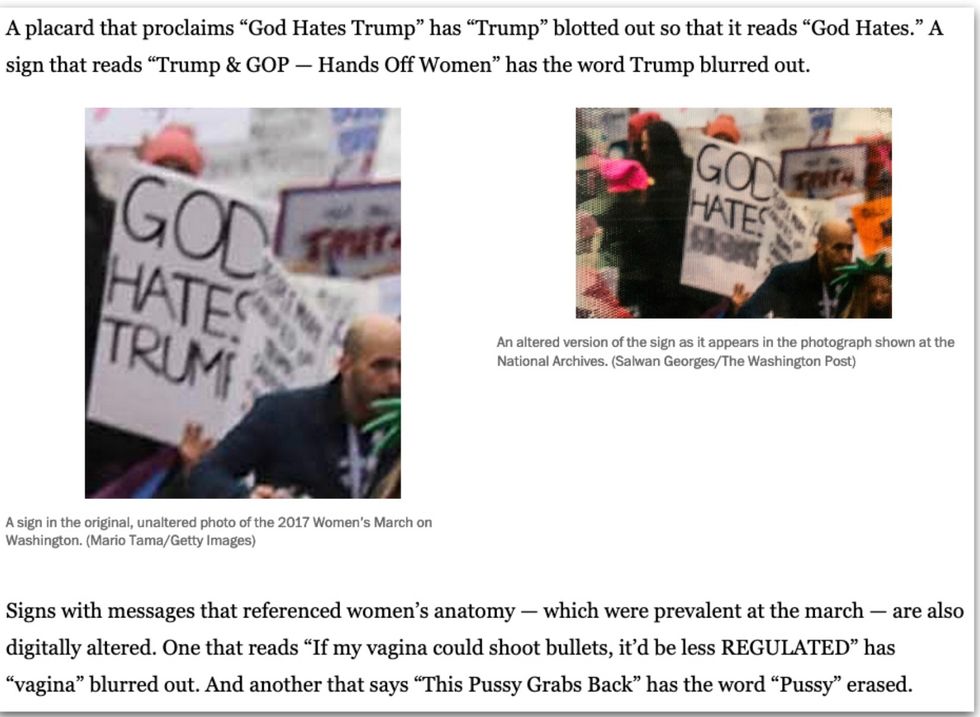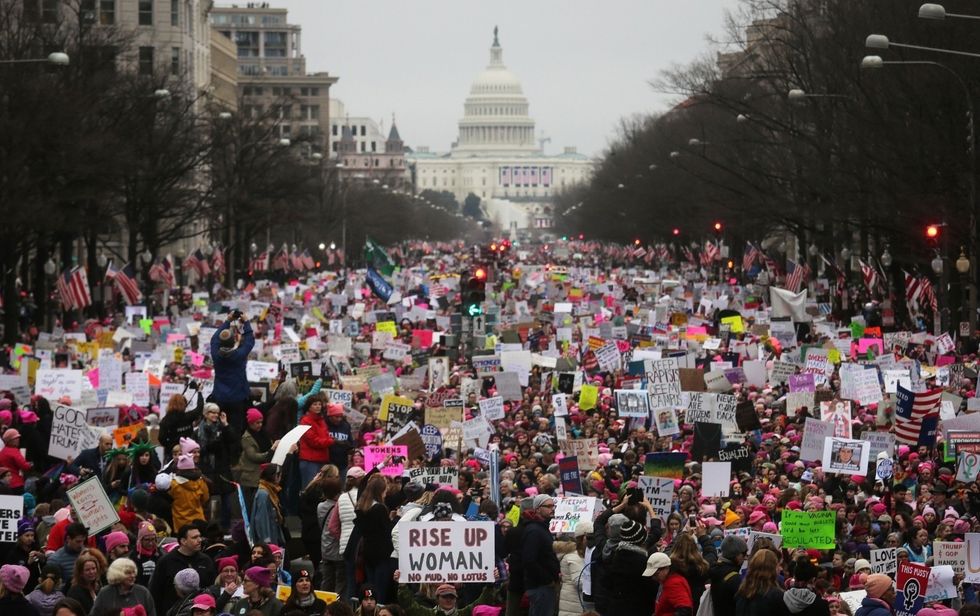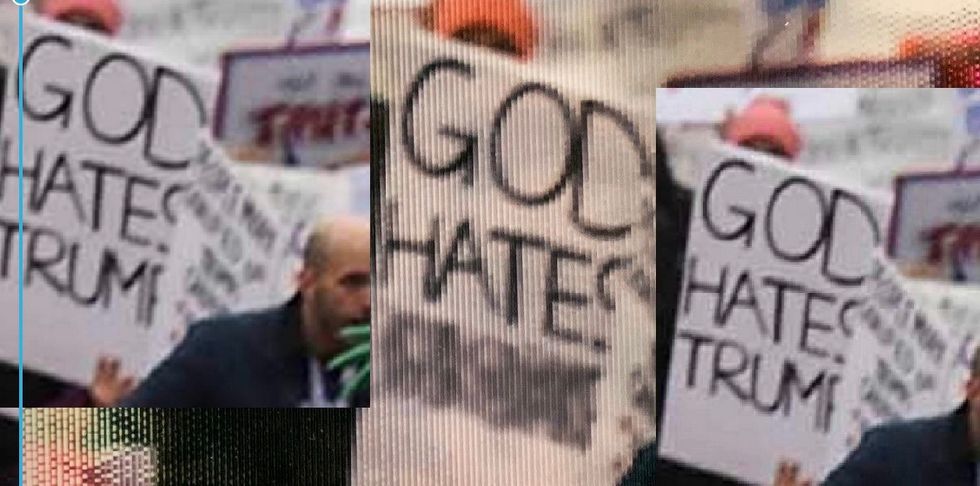The large color photograph that greets visitors to a National Archives exhibit celebrating the centennial of women's suffrage shows a massive crowd filling Pennsylvania Avenue NW for the Women's March on Jan. 21, 2017, the day after President Trump's inauguration.
The 49-by-69-inch photograph is a powerful display. Viewed from one perspective, it shows the 2017 march. Viewed from another angle, it shifts to show a 1913 black-and-white image of a women's suffrage march also on Pennsylvania Avenue. The display links momentous demonstrations for women's rights more than a century apart on the same stretch of pavement.
But a closer look reveals a different story.
The Archives acknowledged in a statement this week that it made multiple alterations to the photo of the 2017 Women's March showcased at the museum, blurring signs held by marchers that were critical of Trump. Words on signs that referenced women's anatomy were also blurred.

In the original version of the 2017 photograph, taken by Getty Images photographer Mario Tama, the street is packed with marchers carrying a variety of signs, with the Capitol in the background. In the Archives version, at least four of those signs are altered.

A placard that proclaims "God Hates Trump" has "Trump" blotted out so that it reads "God Hates." A sign that reads "Trump & GOP — Hands Off Women" has the word Trump blurred out.
Signs with messages that referenced women's anatomy — which were prevalent at the march — are also digitally altered. One that reads "If my vagina could shoot bullets, it'd be less REGULATED" has "vagina" blurred out. And another that says "This Pussy Grabs Back" has the word "Pussy" erased.
The Archives said the decision to obscure the words was made as the exhibit was being developed by agency managers and museum staff members. It said David S. Ferriero, the archivist of the United States who was appointed by President Barack Obama in 2009, participated in talks regarding the exhibit and supports the decision to edit the photo.
“As a non-partisan, non-political federal agency, we blurred references to the President's name on some posters, so as not to engage in current political controversy," Archives spokeswoman Miriam Kleiman said in an emailed statement. "Our mission is to safeguard and provide access to the nation's most important federal records, and our exhibits are one way in which we connect the American people to those records. Modifying the image was an attempt on our part to keep the focus on the records."
Archive officials did not respond to a request to provide examples of previous instances in which the Archives altered a document or photograph so as not to engage in political controversy.
Kleiman said the images from the 2017 and 1913 marches were presented together "to illustrate the ongoing struggles of women fighting for their interests."
The decision to blur references to women's genitals was made because the museum hosts many groups of students and young people and the words could be perceived as inappropriate, Kleiman said in the statement.
Kleiman said the National Archives "only alters images in exhibits when they are used as graphic design components."
"We do not alter images or documents that are displayed as artifacts in exhibitions," she said. "In this case, the image is part of a promotional display, not an artifact."
When told about the action taken by the Archives, prominent historians expressed dismay.
"There's no reason for the National Archives to ever digitally alter a historic photograph," Rice University historian Douglas Brinkley said. "If they don't want to use a specific image, then don't use it. But to confuse the public is reprehensible. The head of the Archives has to very quickly fix this damage. A lot of history is messy, and there's zero reason why the Archives can't be upfront about a photo from a women's march."
Wendy Kline, a history professor at Purdue University, said it was disturbing that the Archives chose to edit out the words "vagina" and "pussy" from an image of the Women's March, especially when it was part of an exhibit about the suffragist movement. Hundreds of thousands of people took part in the 2017 march in the District, which was widely seen as a protest of Trump's victory.
"Doctoring a commemorative photograph buys right into the notion that it's okay to silence women's voice and actions," Kline said in an email. "It is literally erasing something that was accurately captured on camera. That's an attempt to erase a powerful message."
The altered photograph greets visitors to "Rightfully Hers: American Women and the Vote," an exhibit that opened in May celebrating the centennial of women's suffrage. The 19th Amendment to the Constitution, which was ratified in 1920, prohibits the federal government and states from denying the right to vote on the basis of sex.
“This landmark voting rights victory was made possible by decades of suffragists' persistent political engagement, and yet it is just one critical milestone in women's battle for the vote," reads a news release announcing the exhibit on the Archives website.
Archives spokesman John Valceanu said the proposed edits were sent to Getty for approval, and Getty "then licensed our use of the image."
A Getty spokeswoman, Anne Flanagan, confirmed that the image was licensed by the National Archives Foundation but said in an email Friday evening that Getty was still determining whether it approved alterations to the image.
Karin Wulf, a history professor at the College of William & Mary and executive director of the Omohundro Institute of Early American History and Culture, said that to ensure transparency, the Archives at the very least should have noted prominently that the photo had been altered.
“The Archives has always been self-conscious about its responsibility to educate about source material, and in this case they could have said, or should have said, 'We edited this image in the following way for the following reasons,' " she said. "If you don't have transparency and integrity in government documents, democracy doesn't function."
Washington Post, in an article called National Archives exhibit blurs images critical of President Trump, dated January 17, 2020.
The cover photograph was altered by me, to put both images side to side. Here!

###
January 18, 2020
Voices4America Post Script. Write to the Natl Archives to protest - Authoritarian governments distort and rewrite history for their rulers. Yesterday, in 250 cities, #WomensMarch2020 happened. #PussiesMarch Signs again surely read #GODHatesTrump - because she does! #RemoveTrumpNow #SaveDemocracy
Share to fight back against Trump censorship!

